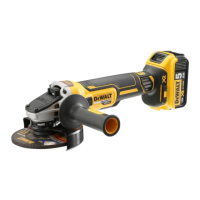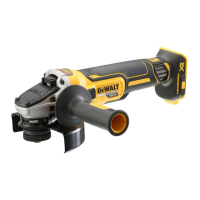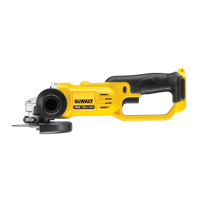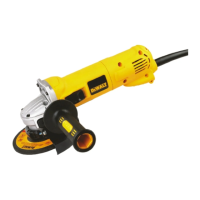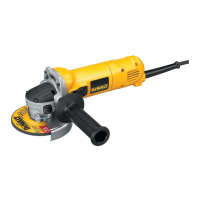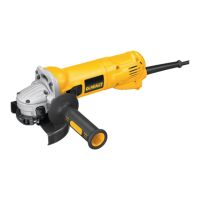8
ENGLISH
c ) When wheel is binding or when interrupting a cut
for any reason, switch off the power tool and hold
the power tool motionless until the wheel comes to
a complete stop. Never attempt to remove the cut-
off wheel from the cut while the wheel is in motion
otherwise kickback may occur. Investigate and take
corrective action to eliminate the cause of wheel binding.
d ) Do not restart the cutting operation in the
workpiece. Let the wheel reach full speed and
carefully re-enter the cut. The wheel may bind, walk up
or kickback if the power tool is restarted in the workpiece.
e ) Support panels or any oversized workpiece to
minimise the risk of wheel pinching and kickback.
Large workpieces tend to sag under their own
weight. Supports must be placed under the workpiece
near the line of cut and near the edge of the workpiece on
both sides of the wheel.
f ) Use extra caution when making a “pocket cut” into
existing walls or other blind areas. The protruding
wheel may cut gas or water pipes, electrical wiring or
objects that can cause kickback.
Safety Warnings Specific for Sanding
Operations
a ) Do not use excessively oversized sanding disc
paper. Follow manufacturer’s recommendations,
when selecting sanding paper. Larger sanding paper
extending beyond the sanding pad presents a laceration
hazard and may cause snagging, tearing of the disc
orkickback.
Safety Warnings Specific for Wire Brushing
Operations
a ) Be aware that wire bristles are thrown by the brush
even during ordinary operation. Do not overstress
the wires by applying excessive load to the brush. The
wire bristles can easily penetrate light clothing and/orskin.
b ) If the use of a guard is recommended for wire
brushing, do not allow any interference of the
wire wheel or brush with the guard. Wire wheel
or brush may expand in diameter due to work and
centrifugalforces.
Residual Risks
In spite of the application of the relevant safety regulations
and the implementation of safety devices, certain residual risks
cannot be avoided. These are:
• Impairment of hearing.
• Risk of personal injury due to flying particles.
• Risk of burns due to accessories becoming hot
duringoperation.
• Risk of personal injury due to prolonged use.
• Risk of dust from hazardous substances.
Chargers
DeWALT chargers require no adjustment and are designed to be
as easy as possible tooperate.
Electrical Safety
The electric motor has been designed for one voltage only.
Always check that the battery pack voltage corresponds to the
voltage on the rating plate. Also make sure that the voltage of
your charger corresponds to that of yourmains.
Your DeWALT charger is double insulated in
accordance with IEC60335; therefore no earth wire
isrequired.
If the supply cord is damaged, it must be replaced only by
DeWALT or an authorised serviceorganisation.
Using an Extension Cable
An extension cord should not be used unless absolutely
necessary. Use an approved extension cable suitable for
the power input of your charger (see Technical Data). The
minimum conductor size is 1mm
2
; the maximum length
is30m.
When using a cable reel, always unwind the cablecompletely.
Important Safety Instructions for All Battery
Chargers
SAVE THESE INSTRUCTIONS: This manual contains important
safety and operating instructions for compatible battery
chargers (refer to TechnicalData).
• Before using charger, read all instructions and cautionary
markings on charger, battery pack, and product using
batterypack.
WARNING: Shock hazard. Do not allow any liquid to get
inside charger. Electric shock mayresult.
WARNING: We recommend the use of a residual current
device with a residual current rating of 30mA orless.
CAUTION: Burn hazard. To reduce the risk of injury,
charge only DeWALT rechargeable batteries. Other types of
batteries may burst causing personal injury anddamage.
CAUTION: Children should be supervised to ensure that
they do not play with theappliance.
NOTICE: Under certain conditions, with the charger
plugged into the power supply, the exposed charging
contacts inside the charger can be shorted by foreign
material. Foreign materials of a conductive nature such
as, but not limited to, steel wool, aluminum foil or any
buildup of metallic particles should be kept away from
charger cavities. Always unplug the charger from the
power supply when there is no battery pack in the cavity.
Unplug charger before attempting to clean
• DO NOT attempt to charge the battery pack with any
chargers other than the ones in this manual. The charger
and battery pack are specifically designed to worktogether.
• These chargers are not intended for any uses other than
charging
DeWALT rechargeable batteries. Any other uses
may result in risk of fire, electric shock orelectrocution.
• Do not expose charger to rain orsnow.
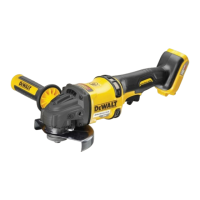
